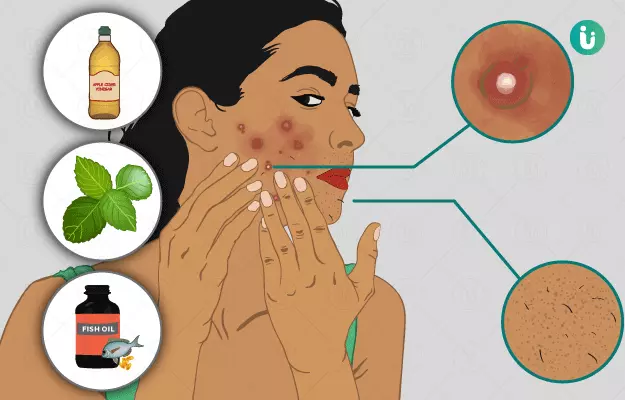Polycystic ovarian syndrome or PCOS is an endocrine (hormones-related) disorder that affects the production of male hormones (androgens) like testosterone in the female body. The exact cause of PCOS is not known but scientists believe that high levels of another hormone—insulin (high insulin or insulin resistance)—may have something to do with it.
Though the word “cyst” occurs in the name of the condition, not all women with PCOS have ovarian cysts. To put it simply, PCOS is a condition in which the ovaries produce lots of follicles that never mature to become eggs. As such, some women with this condition never ovulate (anovulation) and many have enlarged ovaries because of the presence of excess follicles.
The signs of PCOS often include irregular periods, long or heavy periods, acne, excess facial hair and infertility. Women with PCOS may also gain weight more quickly than others, and the added weight could worsen the symptoms of PCOS in turn. (Read more: Female fertility panel test)
PCOS also increases the risk of health problems like sleep apnea, hypothyroidism, type 2 diabetes, high blood pressure and endometrial cancer. (Read more: PCOS and bloating)
It is important to make lifestyle changes in addition to taking treatment for PCOS (treatment usually involves taking combination birth control pills to regulate the hormones).
Herbal and home remedies for PCOS can go a long way to reduce the symptoms of PCOS and prevent complications. For example, diet and exercises to lose weight can improve symptoms considerably. Herbal remedies to improve hormonal balance and control blood sugar could help. Fertility remedies, too, could come in handy depending on your age and stage in life.
PCOS is also known as Stein–Leventhal syndrome after the scientists who described the disorder and its symptoms like anovulation nearly 90 years ago. Read this article to know about home remedies for PCOS, including herbal remedies of PCOS and important lifestyle change that not only reduce the symptoms of PCOS now but can reduce your risk of chronic illnesses in the future.
Read more: PCOS and heart disease risk
- PCOS herbal remedies
- Liquorice or mulethi for PCOS
- Spearmint tea for PCOS
- Flaxseed for PCOS management
- Cinnamon or dalchini for PCOS
- Fish oil for PCOS
- Chamomile for PCOS
- Aloe vera gel for PCOS
- Chinese chasteberry or nirgundi for PCOS
- Other medicinal plants for PCOS
PCOS herbal remedies
Lifestyle management by way of exercises and a healthy diet can help to manage this complex condition. Herbal home remedies, though not a substitute for medicines and your doctor's advice, may boost your reproductive and overall health. Remember to discuss these remedies with your healthcare provider, to know if they are right for you and how much you can safely take.
Having said that, read on to know some herbal remedies for PCOS:
Liquorice or mulethi for PCOS
Liquorice root contains glycyrrhizic acid which is said to reduce testosterone levels in the blood (serum) when taken continually at a dosage of 3.5 gram daily over two months or more. In a review article published in 2012, in the International Journal of Pharmaceutical and Phytopharmacological Research, authors Priyanka Kantivan Goswami, Dr Anubha Khale, Sunita Ogale wrote that this could be because liquorice blocks 17- hydroxysteroid dehydrogenase and 17–20 lyase which are important for the production of sex hormones (blocking these enzymes has an anti-androgenic effect which can improve PCOS by restoring the balance of hormones to an extent).
A research paper published in Frontiers in Endocrinology, a peer-reviewed journal, argued that liquorice has “anti-androgen, estrogen-like activity” that can be useful in the management of PCOS when taken along with spironolactone, a medicine that is usually prescribed to people with low potassium levels and heart issues.
The anti-androgenic effect is because of blocking 17- hydroxysteroid dehydrogenase and 17–20 lyase. Additionally, sustained use of liquorice helps to block an enzyme called 11 beta-hydroxysteroid dehydrogenase 2 (11HSD2) which in turn reduces the amount of cortisol (stress hormone) and androgens in the body.
What you’ll need
- 1 tsp liquorice root or mulethi powder
- 1 cup hot water
Method
Mix the mulethi powder in water and drink it once daily for two months. For continued benefit, drink this brew for a prolonged period.
Spearmint tea for PCOS
Drinking spearmint tea is said to affect luteinizing hormone and follicle-stimulating hormone, which are important for proper menstruation (periods). They are also said to reduce androgens and hirsutism (excess hair).
In a recent, small animal study, PCOS was induced in rats by giving them an estradiol injection. Next, the rats were split up into four groups. In the group that was treated with spearmint and flaxseed extracts, the researchers observed a rise in progesterone hormone and a decline in testosterone levels. The study was published in the Journal of Ovarian Research in March 2020.
What you’ll need
- 2-3 spearmint leaves
- 1 cup hot water
- ¼ tsp honey (optional)
Method
Steep the spearmint leaves in hot water for 2-4 minutes—the longer they steep, the more flavour you will extract from them. You can add a small amount of honey to sweeten the tea, but be careful not to add too much as you need to drink this tea every day for at least one month to see the benefits. (Read more: Benefits and side effects of mint)
Flaxseed for PCOS management
A case study on the effects of flaxseed (alsi) in a 31-year-old PCOS patient showed an improvement in her body mass index and a decrease in her insulin and testosterone levels in just four months. The woman was taking 30 grams of flaxseed supplementation a day. The researchers said that the effect on flaxseed on hormonal imbalance may be attributed to the lignans present in it. Lignans are plant polyphenols. Research has shown that lignans can improve heart health, reduce cholesterol and blood pressure, among other benefits.
What you’ll need
- 2 tbsp flaxseed, finely ground
- 1 cup curd
- Fruit of your choice, peeled and deseeded if necessary
- 1 tsp honey
Method
Although you can eat flaxseed directly (wash it down with water, if you like), it may be difficult to take two tablespoons every day. To mix things up, add flaxseed to your porridge or make a smoothie. Here’s how you can do that:
Add all the ingredients in a blender and mix till it’s smooth. If the mixture is thicker than you like, add water or ice cubes. You can also use almond milk in place of curd for a more milkshake-like consistency. To make it healthier still, add a handful of baby spinach to your smoothie and blend again.
Cinnamon or dalchini for PCOS
Women with PCOS typically have insulin resistance and dyslipidemia (problems with lipid metabolism). Cinnamon or dalchini is said to help with both. A randomized, double-blind, placebo-controlled study of 66 women with PCOS showed that the group that took 1.5 grams of cinnamon powder daily for 12 weeks, in addition to 10 milligrams a day of medroxyprogesterone acetate for the last 10 days of their menstrual cycle, had lower fasting insulin and insulin resistance than the group that got the placebo.
Another (small) study with 15 women found that daily oral intake of cinnamon over eight weeks reduced insulin resistance. The researchers said this was due to increased “phosphatidylinositol 3-kinase activity in the insulin signalling pathway and thus potentiating insulin action”. Phosphatidylinositol 3-kinase is an enzyme that mediates the response of cells to insulin. The researchers said there was a need for a larger study on this, though.
What you’ll need
- Cinnamon extract tablets, or
- ½ inch piece of cinnamon bark or 1 tsp Cinnamon powder
- 1 cup warm water
- 1 green teabag (optional)
- ½ tsp honey (optional)
Method
Cinnamon tablet extracts will have more concentrated cinnamon compounds than you can get from a cut of tea with dalchini (cinnamon). If you can access these tablets, ask your doctor about the correct dosage for you.
Alternatively, you can add a bit of cinnamon to your green tea. Green tea is said to help with weight loss, which also improves hormonal balance and reduces the signs of PCOS.
If you are tired of dieting and exercising and are not able to lose weight, then use myUpchar Ayurveda Medarodh Fat Burner Capsule, it has no side effects, order it today and avail the benefits.
Fish oil for PCOS
Studies have shown that continued use of fish oil tablets or omega 3 supplements, when taken over six months or more, reduce the levels of triglyceride and low-density lipoproteins (bad cholesterol) in the body, which in turn helps to maintain weight. Fish oil may also reduce the interval between periods in women with PCOS.
How to take it
Ask your doctor if you should take fish oil or omega 3 tablets, or a teaspoon of fish oil in your salad daily.
Chamomile for PCOS
Chamomile tea isn’t just delicious, it is also useful for a number of reasons. We all know that a cup of this brew after dinner helps you relax and sleep better (read more: PCOS and sleep apnea). Additionally, a cup during menses can reduce period pain. Women with PCOS may benefit from its blood sugar lowering and anti-inflammatory properties, too.
A study done on rats in a lab showed that chamomile extracts reduced the signs of follicular cysts in two months in rats that were given dosages of 25mg, 50mg or 75mg per kilograms of alcoholic extract of camomile for 10 days.
A randomized trial with 80 women, 40 of whom got 370 mg chamomile tablets thrice a day for three months and the other 40 a placebo, showed that chamomile reduced testosterone levels in the women who got the tablets.
What you will need
- 1 tsp chamomile tea or 1 chamomile teabag
- 1 cup hot water
- A cup with a lid
Method
Add the tea and water in a cup that you can cover properly with a lid. Close the lid and let the tea steep for about four minutes. Drink warm.
Aloe vera gel for PCOS
Aloe vera gel is said to improve hyperlipidemia, improve metabolism, “decrease atretic follicles” and improve normal ovarian function in animal studies, when the animals were given 1 millilitre of the gel daily for 45 days. More research is needed on this, though.
Chinese chasteberry or nirgundi for PCOS
Chasteberry is said to improve the balance of female hormones in the body. A variety of the Vitex shrub that is widely available in South Asia and South-East Asia is the Chinese chasteberry or Vitex negundo (locally known as nirgundi or sinduvara). A herb used in Ayurveda for endometriosis, premenstrual syndrome and infertility, nirgundi is also said to have anti-androgenic properties. Though research on this is sparse, the studies that do exist suggest that the presence of diterpenes in Vitex negundo berries improves the balance of sex hormones, “increases the function of sexual glands. It is used in the treatment of mastitis (breast tissue inflammation), uterine fibroids, menstrual disorders, infertility”.
You should talk to an Ayurveda expert before taking the berries, though. For some people, the Ayurveda practitioner may recommend powdered root, seeds and leaves of the plant instead.
Other medicinal plants for PCOS
According to Indian traditional medicine systems from Ayurveda to Siddha and naturopathy, there are several plant species that can help improve hormonal balance in PCOS. Some of these plants varieties are:
- Shatavari or Asparagus racemosus is said to have phytoestrogen which improves the balance of female hormones in the body. The plant is also said to improve hyperinsulinemia or excess insulin in the blood. Since insulin resistance is closely linked to PCOS, this property to fight excess insulin also helps.
- Guduchi or Tinospora cordifolia helps in controlling blood sugar—which in turn helps to control weight and prevent diabetes in PCOS. It is also said to have anti-inflammatory properties. (Read more: What is prediabetes and what is the treatment for it?)
- Fennel or Foeniculum vulgare is thought to control blood sugar and reduce inflammation. It is also said to be a source of phytoestrogen.
- Tulsi or holy basil (Ocimum tenuiflorum L.) is said to have anti-androgenic properties, meaning it blocks the production of excess male hormones. It is also said to fight obesity and the complications of chronic diseases including diabetes (women with PCOS are at higher risk for diabetes and heart disease).
- Black cohosh contains phytoestrogen and phytoestrogen has been shown to induce ovulation in women with PCOS.
- Veliparuthi or uttaravaruni (Pergularia daemia), also known as utranajutuka, is said to “normalize” menstrual irregularities. It is believed that a more regular menstrual cycle would also reduce the collection of immature follicles in the ovaries (and ovarian cysts in the women who do have them) and provide relief in case of enlarged ovaries.
- Maca or Lepidium meyenii is said to stimulate the production of hormones like estrogen and progesterone and improve hormonal balance.
Takeaways
In PCOS, exercise and diet are equally important. You could take up yoga for PCOS or do cardiovascular exercises for 30 minutes a day, four to five times a week. Weight training is also an excellent way to maintain a healthy weight. Talk to a trained fitness expert for drawing up a workout schedule with enough rest days in-between exercise days, to get the maximum benefit.
You should consult your doctor about the medicines you need to take—herbal remedies are not a substitute for medicines. Instead, they should be seen as an additional step to managing a complex disease that affects fertility, metabolism and so many aspects of your health.
Find Ayurvedic Doctor in cities
Doctors for Polycystic ovarian syndrome herbal and home remedies

Dr. Ayush Bansal
Ayurveda
2 Years of Experience

Dr. Megha Sugandh
Ayurveda
6 Years of Experience

Dr. Nadeem
Ayurveda
3 Years of Experience

















